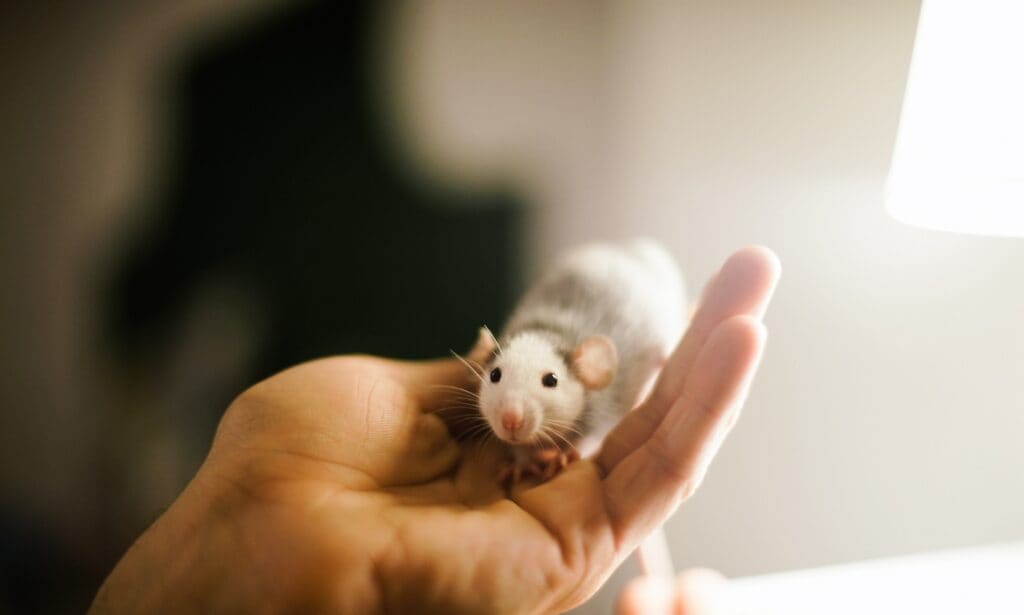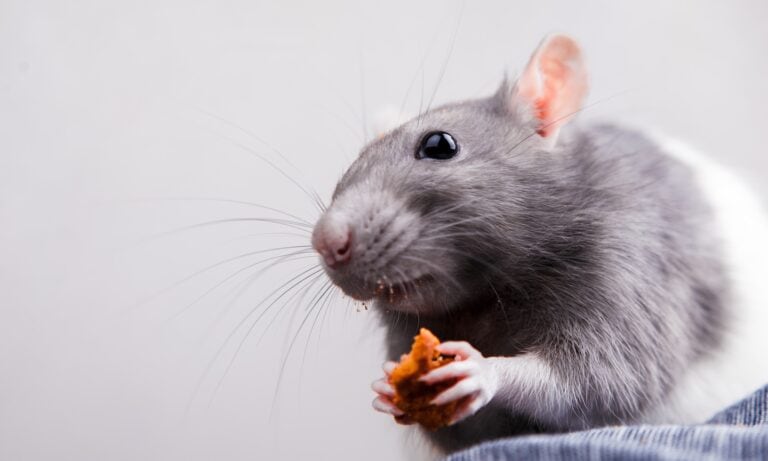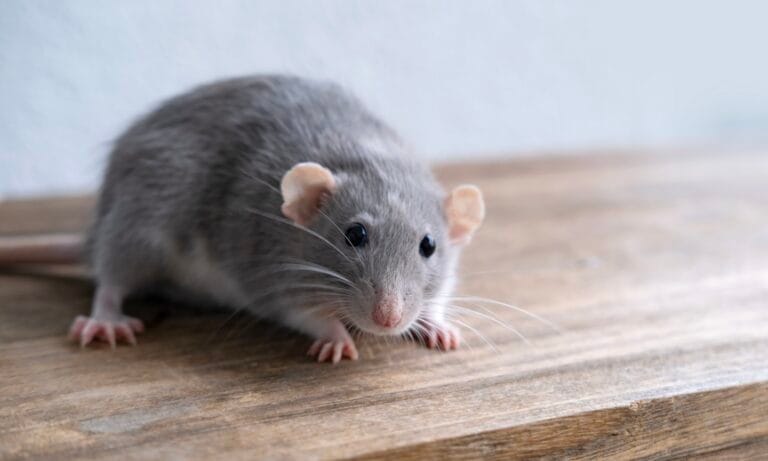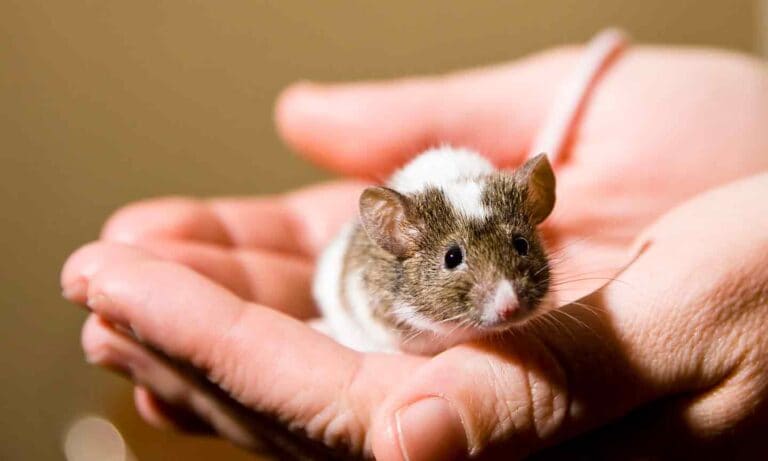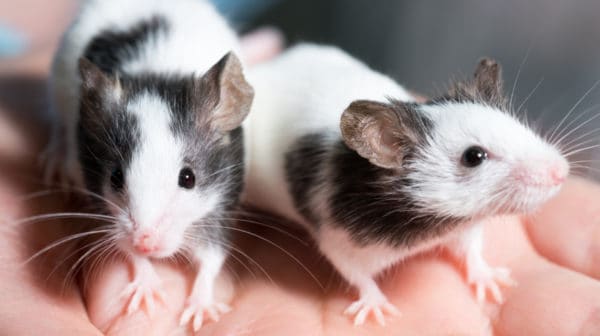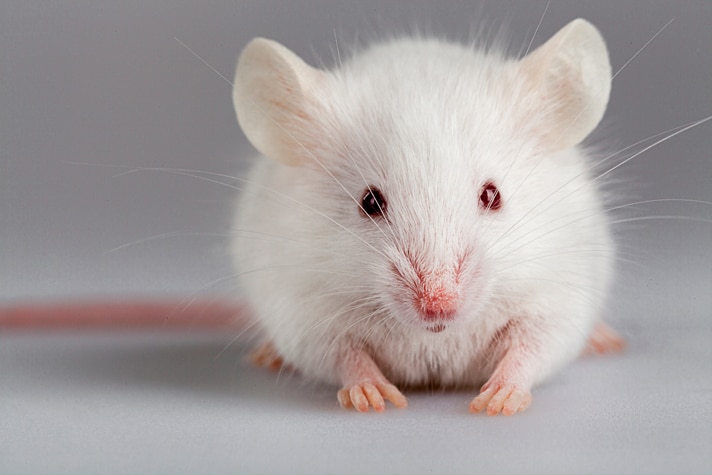Taking care of a pet rat is a rewarding experience. Fancy rats—which are the domesticated form of brown rats—are social, intelligent animals who build a bond with their humans.
When you’re a rat parent, it’s important to understand what it takes to keep your furry friend happy and healthy. Let’s dive in to everything you need to know about rat care, including how long fancy rats live.
In This Guide:
How Long Do Rats Live?
Domesticated rats live between two and three years, but with the right care, some can reach up to 4 years of age. Female rats tend to live longer and mature earlier than males.
“Unfortunately, our beloved rat companions do not tend to live as long as we’d like them to and usually have several health problems,” says Sandra Mitchell, DVM, DABVP, a veterinarian and the owner of All Creatures Veterinary Services, in Eddington, Maine.
Wild rats typically don’t live as long as domesticated fancy rats. They usually live less than a year, due to multiple factors, such as:
- Lack of food and natural resources
- Lack of proper care and environment
- Susceptibility to disease
- Genetic predispositions
- Threats from predators
Rat Life Stages
There are three distinct life stages of a rat—baby, adult, and senior. At each stage, new personality traits emerge, such as playfulness, curiosity, and independence.
Pups
Baby rats, or pups, are born hairless and blind, and are in this development stage for the first few weeks of life. They open their eyes at about 12 to 15 days old.
When they’re 6 weeks old, they can leave their litter and head to their new life as your favorite, whiskery pet. Females and males should be separated at this point, as they are able to reproduce at this age.
Adults
Rats are considered full grown at 6 months old. Adult males, called bucks, weigh between 16 and 23 ounces, and females, called does, are smaller, at around 12 to 16 ounces.
As they age and grow comfortable in their home, they become more curious about their surroundings, and you’ll start to see their personality really shine through.
This is a fun stage because they want to interact with their new pet parents! This is also when they need regular visits to their exotic animal vet. It’s ideal to take your rat to the vet within 48 hours of adopting them.
Seniors
Rats are considered senior after they turn 2 years old. They’re less active at this phase of life and will need more care, like more vet visits and a change in diet.
When rats are older, their metabolism slows down and their kidneys can’t process protein as well as they used to. Changing their diet to a lower protein and phosphorus option can help.
Typically, a diet containing 11% to 14% protein is best, but consulting with your veterinarian based on health status and activity levels to find an appropriate diet for your individual pet is most ideal.
How To Keep Your Rat Healthy
Let’s look at a few ways you can help your pet rat be happy, healthy, and live longer.
Diet and Nutrition
“The single biggest thing that can be done to extend both the longevity of life and the health of a rat is actually calorie and food restriction,” Dr. Mitchell says.
Without a proper diet, rats are prone to more diseases and will have a shorter lifespan.
It’s important to follow the food bag instructions and weigh your rat weekly to know the appropriate amount to feed per day. If you have any questions or concerns, consult your primary veterinarian.
According to Mainely Rat Rescue, an ideal diet consists of 14% to 16% protein and 8% fat. Younger rats, around 7 months old, require more protein, whereas older rats require less. As rats age and their metabolism slows down, their kidneys can’t process protein as well.
Along with fruits and vegetables (no more than 20% of their daily diet), rats can feast on various packaged grains and small quantities of treats that are also healthy for humans, like samples of unseasoned boiled chicken, seafood (such as prawn or shrimp), cooked scrambled eggs, and rice.
Certain vegetables can be fed three times per day (1 to 2 teaspoons each). Examples of safe vegetables to give your rat daily include:
- Kale
- Broccoli
- Cauliflower
- Mushrooms
- Sprouts
- Carrots
- Asparagus
- Zucchini
- Arugula
- Peas
- Green beans
- Pumpkin
Some examples of daily fruit that can be served once (1/2 to 1 teaspoon) per day:
- Strawberries
- Blueberries
- Raspberries
- Blackberries
- Peach (no pit)
- Pear
- Kiwi
- Melon
- Tomato
- Banana
- Cherries (no pit)
Environment
Environmental factors and exercise can also affect the lifespan of a rat. It’s important to have the right kind of enclosure and bedding for your little friend, such as a multilevel wire cage with solid flooring.
Rats like to nest, so the types of bedding that work well are shredded paper and tissues. You can also add a fleece liner to the cage floor to help support their feet and help avoid foot ulcers and bacterial infections.
The temperature of your rat’s enclosure is also important. Rats are sensitive to extreme temperatures; the optimal range for them is 65 F to 80 F.
To make sure they don’t become bored or depressed, you can install ladders, ramps, and platforms within their cage, and give them access to toys like puzzles and treat dispensers.
A rat’s front teeth grow continuously, so they need safe objects to chew and gnaw on throughout the day.
Social and Play Time
Rats are social creatures and benefit from interacting with others of their kind.
Socialization helps increase their well-being and reduces stress, ultimately resulting in a longer lifespan.
Animals, in general, need plenty of stimulation, and these critters are no exception. It’s usually recommended to take home two rats together so that they can keep each other busy. They like to play games, cuddle, and groom each other.
Even if they have a large enclosure, rats still enjoy exploring outside their cage, so creating a rat-safe area in your home for them to sniff, run, and hide in will be a great benefit.
How To Improve Your Rat’s Lifespan
Taking your rat to the vet is a must and can help improve their lifespan. By being proactive with your rat’s healthcare, you can help prevent any potential issues.
“We typically recommend visits to a vet every six months in their first 12 to 18 months of life, then every three months as they age or as they develop longer-term health issues,” says Meera Kumar Music, BVM&S, MRCVS, co-medical director at The Center for Bird and Exotic Animal Medicine in Bothell, Washington. “The key to a long, healthy life is often focusing on prevention of disease, rather than treatment,” she says.
Tips for Caring for Senior Rats
Even though senior rats are much less active, that doesn’t mean they require less care.
“Caring for senior rats comes down to attention to detail. If something looks off, assume that it is and be proactive,” Dr. Mitchell stresses. “Older rats are very prone to problems and frequently need veterinary care. When in doubt, check it out.”
Appearance
It’s common for rex rats to lose hair as they get older, but it’s still important to watch for changes in their fur, which can signal health concerns.
Appetite
As pet rats age, they are less hungry, but it’s still essential to keep track of their eating habits. If they start refusing hard food, there might be an issue with their teeth.
Elderly rats are more susceptible to overgrown or misaligned teeth, making it difficult to eat. You’ll want to start feeding them softer foods, and a vet can help with teeth trimming.
Mobility
Senior rats also tend to have mobility problems, like leg weakness and arthritis. Some medications might help, but you’ll need to make changes to their cage, like taking away objects their legs can get caught on and lowering or removing the levels of the cage that have become hard for them to climb.
Self-Care
As rats age, they’ll have a harder time grooming themselves.
To keep them clean, you can use dampened tissue to gently wipe their body and ears and clip or file their nails to stop them from curling.
Rats are loving creatures, and taking care of one (or two!) will be worth every affectionate lick and squeak they give you in return.
Expert input provided by Meera Kumar Music, BVM&S, MRCVS, co-medical director at The Center for Bird and Exotic Animal Medicine in Bothell, Washington and Sandra Mitchell, DVM, DABVP, owner of All Creatures Veterinary Services in Eddington, Maine.
Like this story? Check out more of our favorite reads:
Share:
